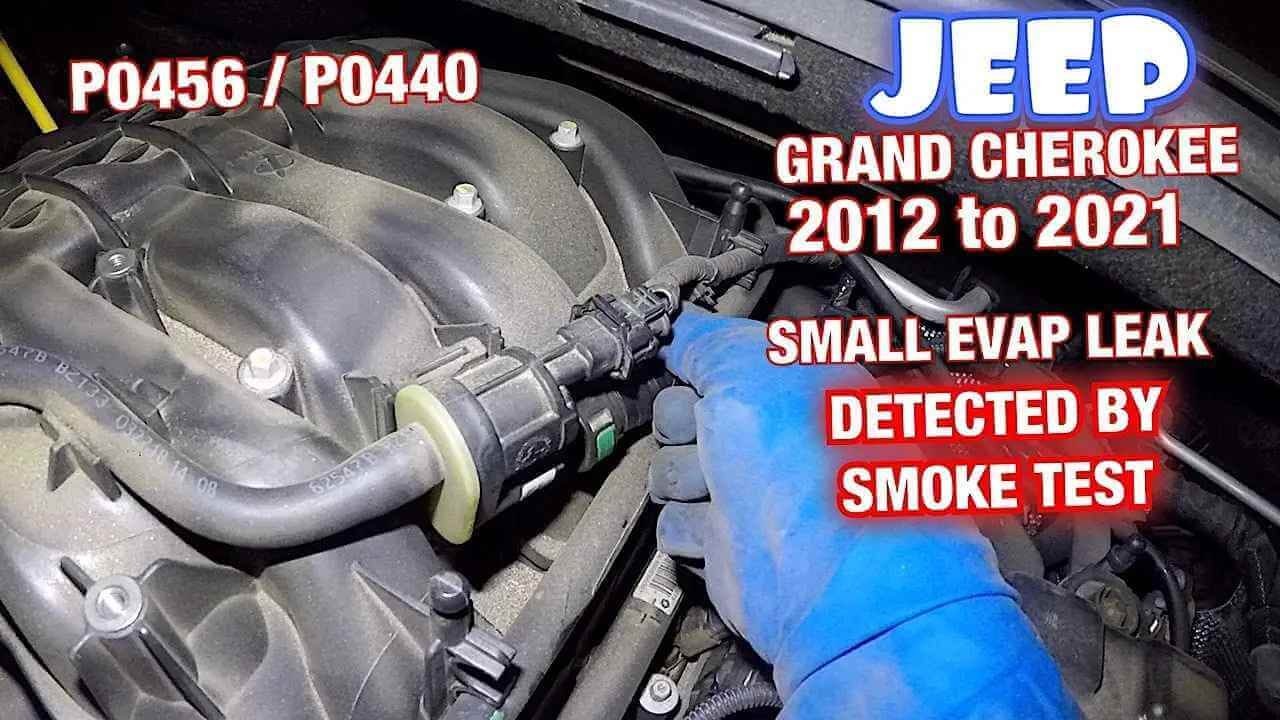If you own a Jeep, there’s a good chance you’ve come across some error codes from time to time. While most are relatively minor and easy to deal with, some can be trickier to understand. One of the most common trouble codes many Jeep owners encounter is the [P0456 Jeep] code. In this article, we’ll break down everything you need to know about this specific code and what to do if you ever encounter it in your vehicle.
What Does the [P0456 Jeep] Code Mean?
The [P0456 Jeep] code is a diagnostic trouble code (DTC) that indicates a small leak detected in the evaporative emission control (EVAP) system. The EVAP system prevents fuel vapours from escaping into the atmosphere. When your vehicle’s computer detects a small leak within this system, it triggers the P0456 code, which means you’ll likely see the check engine light pop on.
Key Components of the EVAP System:
- Fuel Tank: Stores gasoline and contains vapour.
- EVAP Canister: Collects and stores fuel vapors.
- Purge Valve: Controls when the vapour is sent to the engine.
- Vent Valve: Regulates the release of vapors into the atmosphere.
- Fuel Cap: Seals the fuel system to prevent vapours from escaping.
A small leak can come from any of these components, but often, it’s something as simple as a loose or damaged fuel cap. However, the P0456 code can also indicate more serious issues within the system that may require further inspection.
Common Symptoms of the [P0456 Jeep] Code
When the [P0456 Jeep] code is triggered, there are several signs that you might notice in your vehicle. Some symptoms are obvious, while others are subtle. Here’s what you should keep an eye on:
- Check Engine Light: The most common symptom of the [P0456 Jeep] code is the check engine light turning on.
- Slight Gasoline Odor: You may notice a faint smell of fuel around your Jeep due to vapours escaping.
- Reduced Fuel Efficiency: A leak in the EVAP system can lead to minor decreases in fuel efficiency.
- Failed Emissions Test: Since the EVAP system controls fuel vapour emissions, a malfunction can cause your Jeep to fail an emissions test.
While these symptoms might seem minor, it’s important not to ignore them. The [P0456 Jeep] code may not impact your Jeep’s performance immediately, but it does mean something is wrong with the EVAP system, which could lead to bigger issues down the road.
Common Causes of the [P0456 Jeep] Code
Various issues can cause the [P0456 Jeep] code of these problems to be easy to fix, while others may require professional attention. Let’s take a closer look at some of the most common causes of this code:
- Loose or Damaged Fuel Cap
Believe it or not, a loose or damaged fuel cap is one of the most common causes of the [P0456 Jeep] code. Fuel vapours can escape if the cap isn’t sealed tightly, triggering the code. This is usually the easiest fix, and you can often resolve the issue simply by tightening or replacing the cap.
- Faulty Purge or Vent Valve
The purge and vent valves control the flow of fuel vapors. If one of these valves malfunctions, it can cause a leak within the EVAP system and trigger the [P0456 Jeep] code.
- Cracked EVAP Canister or Hoses
Over time, the canister and hoses in the EVAP system can develop cracks or leaks. This can cause fuel vapours to escape and trigger the code. In this case, you’ll need to replace the damaged component.
- Damaged EVAP System Components
Any of the components in the EVAP system, including the fuel tank or pressure sensor, can develop a fault. If one of these parts is damaged, the [P0456 Jeep] code will appear.
- Leaking Charcoal Canister
The EVAP canister is filled with activated charcoal to absorb and store fuel vapours. If the canister becomes damaged or worn out, fuel vapours can leak, triggering the code.
How to Diagnose the [P0456 Jeep] Code
Diagnosing the [P0456 Jeep] code requires a combination of tools and know-how. While it’s possible to figure out the cause of the code on your own, many Jeep owners take their vehicles to a professional mechanic. Here’s how the diagnosis process typically works:
- OBD-II Scanner: The first step is to use an OBD-II scanner to read the codes stored in your Jeep’s computer. This will confirm whether the P0456 code is present and if there are any other related codes.
- Inspect the Fuel Cap: Since a loose fuel cap is one of the most common causes, the next step is to inspect the cap to ensure it’s tight and not damaged. Replacing the cap if worn or cracked may solve the issue.
- Perform a Smoke Test: A smoke test is commonly used to detect leaks in the EVAP system. A technician will introduce smoke into the system during this test and watch for leaks. If smoke escapes from a component, that part is likely the source of the leak.
- Check Valves and Hoses: The purge valve, vent valve, and hoses are inspected for any signs of damage or wear. If any part appears faulty, it will need to be replaced.
- Examine the Canister: The EVAP canister is checked to ensure it’s in good condition and not leaking vapours.
How to Fix the [P0456 Jeep] Code
Once you’ve diagnosed the cause of the [P0456 Jeep] code, it’s time to fix it. The solution will depend on what’s causing the code in the first place. Here are some common fixes for the P0456 code:
- Tightening or Replacing the Fuel Cap: If the issue is as simple as a loose fuel cap, tightening or replacing it with a new one should clear the code.
- Replacing Faulty Valves: If the purge or vent valve is malfunctioning, it will need to be replaced to restore proper function to the EVAP system.
- Repairing or Replacing Damaged Hoses: Cracked or damaged hoses should be replaced to prevent fuel vapours from leaking.
- Replacing the EVAP Canister: If the canister is the source of the leak, you’ll need to replace it to fix the issue.
- Clearing the Code: Once the necessary repairs have been made, the code can be cleared using an OBD-II scanner. If the problem is resolved, the check engine light should go off.
Preventing Future [P0456 Jeep] Codes
While some issues with the EVAP system are unavoidable, there are steps you can take to reduce the risk of encountering the [P0456 Jeep] code in the future:
- Ensure Your Fuel Cap Is Properly Sealed: Ensure your fuel cap is tight and properly sealed after filling your tank.
- Inspect EVAP System Components Regularly: Inspecting your Jeep’s EVAP system for any signs of wear or damage can help you catch problems early.
- Schedule Routine Maintenance: Keeping up with your Jeep’s scheduled maintenance can help prevent EVAP system issues from arising.
Table: Common Causes and Solutions for the [P0456 Jeep] Code
CauseSolution
Loose or damaged fuel cap: Tighten or replace the fuel cap
Faulty purge or vent valve: Replace the malfunctioning valve
Cracked hoses or canisters Repair or replace damaged components
Leaking charcoal canister: Replace the EVAP canister
General EVAP system damage Inspect and repair/replace as necessary
Frequently Asked Questions About the [P0456 Jeep] Code
Is It Safe to Drive with the [P0456 Jeep] Code?
Yes, driving with the [P0456 Jeep] code is generally safe, but it’s not something you should ignore for too long. While the code doesn’t usually indicate an immediate safety issue, it does mean there’s a leak in your EVAP system, which could lead to more significant problems if left unresolved.
How Much Does It Cost to Fix the [P0456 Jeep] Code?
The cost to fix the [P0456 Jeep] code varies depending on the cause of the issue. A simple fuel cap replacement might cost around $20 while repairing a more complex issue like a faulty valve or canister could run between $100 and $400.
Can I Clear the [P0456 Jeep] Code Without Fixing the Problem?
While it’s possible to clear the code using an OBD-II scanner, this will not fix the underlying issue. If the root cause of the problem has not been addressed, the code will likely reappear.
Conclusion
The [P0456 Jeep] code is a common yet manageable issue many Jeep owners will face at some point. Whether caused by something as simple as a loose fuel cap or a more complex issue within the EVAP system, understanding the code and how to fix it is key to keeping your vehicle in top condition. By staying on top of routine maintenance and addressing any issues promptly, you can prevent future occurrences and ensure your Jeep continues to run smoothly.
If your check engine light comes on and you suspect it might be the [P0456 Jeep] code, don’t panic. Follow the steps outlined in this guide, and you’ll be back on the road soon!

